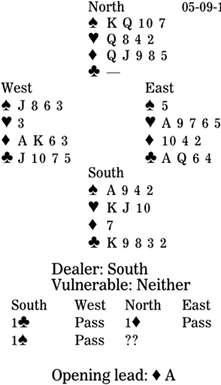Sir Winston Churchill said, "The statesman who yields to war fever must realize that once the signal is given, he is no longer the master of policy but the slave of unforeseeable and uncontrollable events."
The defenders, during the war at the bridge table, must signal and hope that each will be interpreted correctly.
This deal came from a reader who requested anonymity. First, what should North rebid over partner's one spade? Second, how should the defenders play assuming South is in four spades, and West leads the diamond ace?
In the bidding, first, I agree with North's responding one diamond, not one heart. His hand has good potential for a diamond contract, and South can easily show a four-card major. Second, I think North should rebid four spades. It is a slight overbid, but it pays to push for game. (If you employ splinter bids, North should not rebid four clubs, because he has far too many red-suit losers.)
With four trumps, you rarely look for a ruff. But here, after East signaled with the diamond two at trick one, West shifted to his singleton heart. (Yes, a club switch would have been best, but that was nearly impossible to find.) East won and carefully returned the heart five, his lowest heart being a suit-preference signal for clubs.
At the table, West ruffed and tried to cash the diamond king. South ruffed, drew trumps, and coasted home. West erred. If East had started with a singleton diamond, he would have led his highest heart at trick three.


























 Raymond Zhou:
Raymond Zhou: Pauline D Loh:
Pauline D Loh: Hot Pot
Hot Pot Eco China
Eco China China Dream
China Dream China Face
China Face






